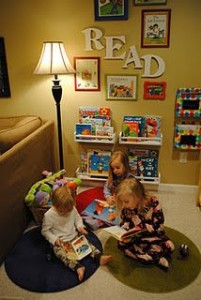The good news is that many parents I know are already doing many of these things! And for those that aren’t, it doesn’t take too much time or effort each week to get started.
PISA, or Program for International Student Assessment, do assessments worldwide on 15 year olds every few years, to see what skills and knowledge they have developed throughout their school years. In the assessment done a few years ago, based on reading skills, a survey was also done with the parents of these kids, and the results from the tests compared to the parent’s survey findings.
The survey asked things like family background, family wealth, school choice, reading habits, spending on school activities, but mostly focusing on the type of engagement parents had with their kid’s reading, education and school. Overwhelmingly, the common points of real difference were basic things we can all do, regardless of wealth, background or home-situation:
- Reading to your children before, and as they begin Primary school, is one of the most important things. Yes, we all know this, but it’s proven time and time again that parents reading help with further learning through understanding of language and language’s relationship to all other forms of learning
- The importance of them understanding that reading is important to you came through in the PISA surveys clearly too. So it’s not just that you read to them, but that it’s an important part of your life can “demonstrate positive attitudes towards reading”
- Be involved in your child’s education in real ways like knowing and having discussions with the teacher, being a part of a reading or other program at school so your child knows school is valued and that “education is a shared responsibility”
- Talking with older children and adolescents about social or political issues that are important to you and to them, and engaging with them throughout their childhood and teenage years with discussion that show you are still learning and have interest in the world around you.
You can make a REAL difference by building a 10 or 20 minute slot of reading into your daily routine. And it’s not just about reading TO THEM, but having them SEE YOU READ can really encourage their interest in reading and it’s benefits as a relaxing but engaging activity!
So you could try alternating between:
- READING TO THEM – often best to do when you want to motivate them to get into bed and help them get to sleep) and
- ENCOURAGING THEM TO READ ON THEIR OWN WHILST YOU READ – If you are relaxing nearby or laying on the floor next to them reading they will be much more likely, over time, to see it as normal and a valued behaviour that they will want to copy!
Be sure to praise them for “reading so well and quietly” by themselves every minute or so depending on the child. And ask them questions about what they’ve been reading to encourage any expression/interpretation of what they’ve read… the more imaginative and far-fetched the better! If you notice them starting to get bored and loose interest after short periods trying either of these approaches to “re-engage” them.
 As it’s unlikely to have any adverse long-term consequences, it can’t do any harm to give it a try and find out if it might benefit your little people in some way! Just imagine, Peppa Pig being enjoyed in a near silent household … sounds like paradise doesn’t it 🙂
As it’s unlikely to have any adverse long-term consequences, it can’t do any harm to give it a try and find out if it might benefit your little people in some way! Just imagine, Peppa Pig being enjoyed in a near silent household … sounds like paradise doesn’t it 🙂

